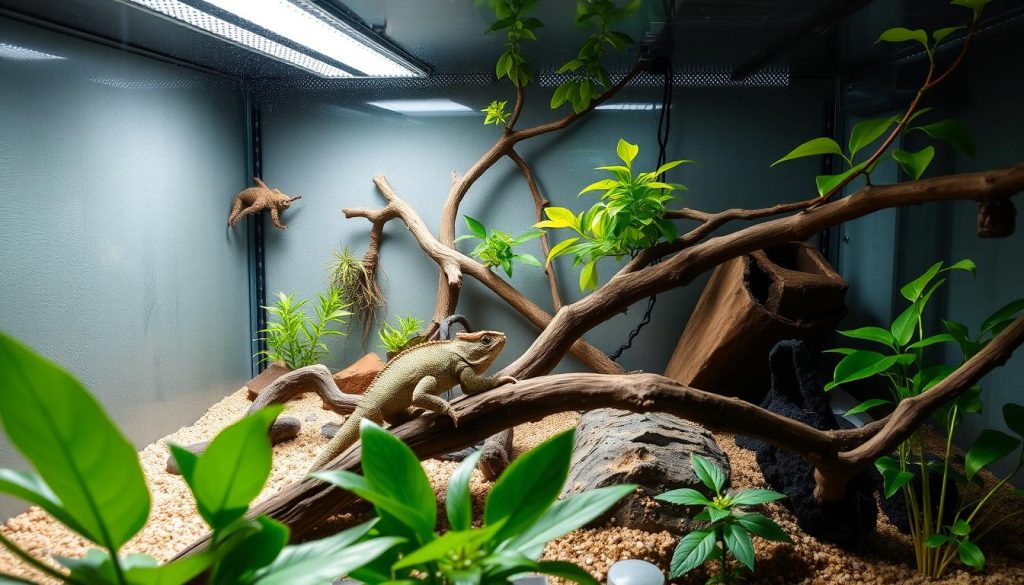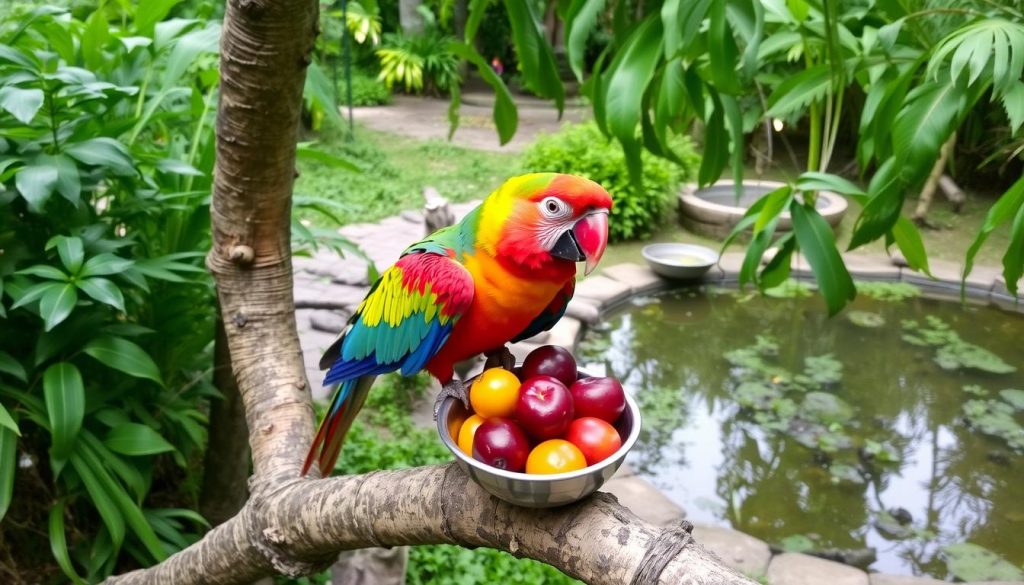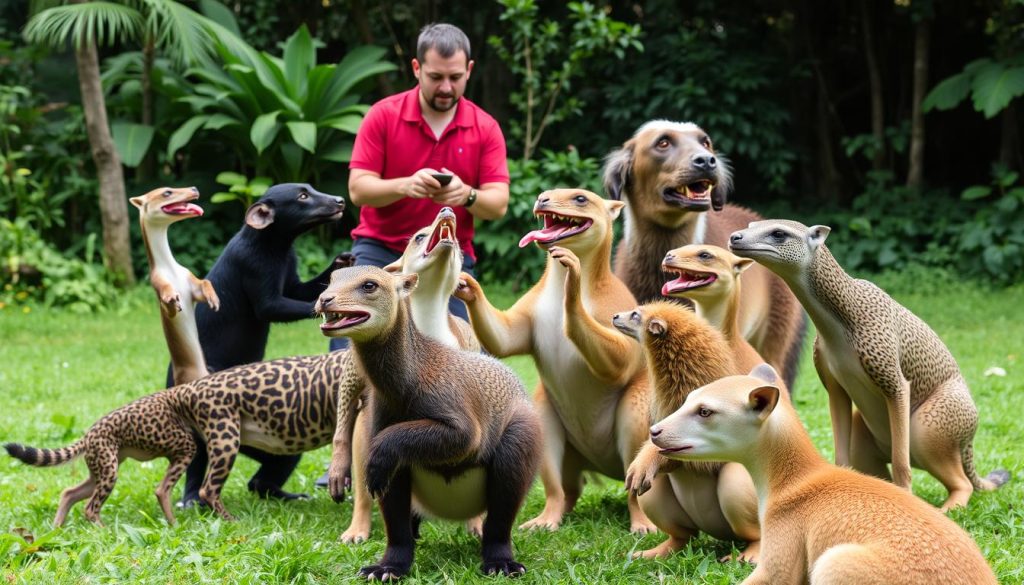Adopting exotic pets is thrilling and rewarding. It allows you to share your home with unique animals. From colorful birds to reptiles, these pets offer a special bond. However, it’s important to research and prepare for the care they need.
This guide will help you understand the basics of exotic pet adoption. We’ll cover legal issues, lifestyle checks, and how to pick the right pet. We’ll also talk about setting up a good home, feeding, health care, and enrichment. By the end, you’ll be ready to start your exotic pet journey.
Key Takeaways
- Research exotic pet laws and regulations in your area before adopting
- Assess your lifestyle and environment to determine if an exotic pet is a good fit
- Choose an exotic pet species that aligns with your experience level and commitment
- Create a suitable habitat with appropriate supplies and equipment
- Provide a balanced diet, veterinary care, and enrichment for your exotic pet
- Understand natural behaviors and implement basic training techniques
- Be prepared to address common challenges, such as aggression or allergies
Understanding Exotic Pets
When looking into alternative pet choices, it’s key to know what makes exotic pets different. These are not your typical pets like dogs and cats. They include reptiles, amphibians, birds, and some small mammals. Each has its own special care needs and might not fit every home.
Defining Exotic Pets
Exotic pets are not usually kept as pets. They are often wild animals or ones not bred for pet life. Their unique looks or behaviors can make them interesting. But, they also bring challenges and big responsibilities.
It’s important to know that exotic pets need special care. They might need special food, homes, and vet visits. This can be expensive and take a lot of time. Some exotic pets can also be a risk to their owners and others.
Common Exotic Pet Species
Exotic pets include many animals, each with its own needs. Here are some common ones:
- Reptiles: Iguanas, bearded dragons, snakes, and tortoises
- Amphibians: Frogs, salamanders, and newts
- Birds: Parrots, cockatoos, and finches
- Small Mammals: Hedgehogs, sugar gliders, and fennec foxes
Before getting exotic pets to adopt, do your homework. Each species has its own care needs. For instance, iguanas eat leafy greens, while parrots need to stay sharp and social.
| Exotic Pet Category | Example Species | Key Considerations |
|---|---|---|
| Reptiles | Iguanas, bearded dragons | Need special heat and light, certain foods |
| Amphibians | Frogs, salamanders | Need a controlled home, are sensitive to changes |
| Birds | Parrots, cockatoos | Need big spaces, fun, and friends |
| Small Mammals | Hedgehogs, sugar gliders | Have special diets, might need special vet care |
Knowing about the variety of exotic pets and their needs helps people make good choices when adopting exotic pets. Doing your homework and preparing is key to taking care of both the pet and yourself.
Researching Exotic Pet Ownership
Before you start with exotic pets, do your homework. This ensures you’re ready for the unique challenges and duties of caring for these special animals. Knowing all about exotic pet ownership helps you make a smart choice and care for your new friend well.
Exotic Pet Laws and Regulations
Start by learning about the laws and rules for these pets. Laws on exotic pets change a lot by place, with some places having strict rules or even bans on certain animals. It’s key to know the rules in your area to avoid legal trouble and keep your pet safe.
Assessing Your Lifestyle and Environment
Think about if your home is right for an exotic pet. Consider things like:
- Space for the pet’s home and activities
- Time for daily care and playing with your pet
- Money for food, vet visits, and the right home
- How it fits with your family and other pets
Looking at your life and home helps you see if an exotic pet is a good fit for you and your family.
Evaluating the Long-Term Commitment
Having an exotic pet means making a big promise for the long run. Some exotic animals live a long time, up to decades or more. You need to be ready for the ongoing costs and care needs of your pet, including:
| Aspect | Consideration |
|---|---|
| Lifespan | Learn the average life span and be ready for a long commitment |
| Diet | Know the special diet needs and the cost of it |
| Veterinary Care | Find vets who know about exotic pets and plan for vet visits and emergencies |
| Habitat Maintenance | Think about the cost and time to keep your pet’s home right |
| Life Changes | Think about how life changes, like moving or starting a family, might affect your pet care |
Choosing to own an exotic pet is a big decision. It means a big promise to care for your pet well for its whole life.
By doing your homework on exotic pet ownership, understanding the laws, checking your lifestyle, and thinking about the long-term, you can make a smart choice. This way, you’ll be ready to give your exotic pet a happy, healthy life.
Choosing the Right Exotic Pet for You
When thinking about getting an exotic pet, make sure it fits your lifestyle, experience, and personality. It’s important to learn about the needs of different exotic pets to ensure you can take good care of them. Also, spend time with the pet before you decide to make sure it’s a good match.
- Space requirements: Check if your home has enough room for the pet’s habitat and where it will move around.
- Time commitment: Think about how much time you can spend on your pet, like feeding, cleaning, and playing with it.
- Financial resources: Look at the costs of owning an exotic pet, like buying the setup, food, vet care, and supplies.
- Experience level: Think about your past experience with pets and if you’re ready to care for the exotic pet you want.
- Compatibility with your lifestyle: Consider how the pet’s needs and habits fit into your daily life and what you like.
It’s key to learn about the needs of different exotic pets before you decide. Use trusted sources like care guides, vets who know about exotic animals, and people who own these pets for advice.
| Exotic Pet Species | Key Considerations |
|---|---|
| Birds | Need big cages, varied food, and lots of social time |
| Reptiles | Require special temperatures, certain foods, and the right homes |
| Small Mammals | Need safe homes, food just for them, and lots of play and exercise |
| Amphibians | Need special environments, certain food, and regular checks |
“Choosing the right exotic pet means thinking about your life, what you know, and what the pet needs. Do your homework and meet the pet to make sure you both will be happy.”
Before you make up your mind, meet the exotic pet you’re interested in. Go to good pet stores, visit pet shows, or talk to other owners to see and touch the animals. This will give you a good idea of their personality and if they fit with you.
By thinking carefully and doing lots of research, you can pick the best exotic pet for you.
Preparing Your Home for an Exotic Pet
Before you bring your new exotic pet home, make sure your living space is ready. It’s key to set up a safe, comfy, and interesting place for your pet. This helps keep them healthy and happy. Getting everything ready ahead of time helps your pet feel at home and reduces stress.
Creating a Suitable Habitat
Creating a habitat that feels like their natural home is crucial for exotic pet care. Think about the size of the space, the right temperature and humidity, and where your pet can hide or climb. Learn what your exotic pet needs to stay healthy and happy.

For example, bearded dragons need a big terrarium with a warm spot, UVB lights, and a temperature range. Sugar gliders require a tall cage with lots of branches, places to nest, and toys. Tailor the habitat to your pet’s needs for their best life.
Essential Supplies and Equipment
You’ll also need the right supplies and equipment for your exotic pet. This includes:
- Appropriate food and water dishes
- Substrate or bedding material
- Heating and lighting elements
- Humidifiers or misting systems
- Thermometers and hygrometers for monitoring environmental conditions
- Cleaning supplies and disinfectants
- Enrichment items like toys, puzzles, or hiding spots
Here’s a table with some common exotic pets and what they need:
| Exotic Pet | Essential Supplies |
|---|---|
| Bearded Dragon | Terrarium, basking lamp, UVB bulb, substrate, food and water dishes, thermometer, hideaways |
| Green Iguana | Large enclosure, UVB lighting, basking area, branches, humidifier, food and water dishes, substrate |
| Hedgehog | Cage, bedding, food and water dishes, exercise wheel, hideaways, toys, heating pad |
| Parakeet | Birdcage, perches, food and water dishes, toys, cuttlebones, bird-safe mirror |
This list is just a start. Always check with a vet or an expert in exotic pets to make sure you have everything your pet needs.
Getting ready is key to bringing an exotic pet into your home. With the right habitat and supplies, you’ll give your new pet a happy, healthy life.
Adopting Exotic Pets
Thinking about getting an exotic pet? Adopting from a good adoption center is a great choice. You’ll get an animal that’s been checked for health, cared for, and socialized. These centers focus on the animals’ well-being and help them find great homes.
Finding Reputable Exotic Pet Adoption Centers
Start by looking online and contacting local animal groups to find good adoption centers. These places list trusted centers for exotic pets. You can also ask vets who know about exotic animals or join groups for exotic pet owners for advice.
Check if an adoption center is professional, open, and cares deeply for animals. A good center has experts, clean places, and a detailed adoption process. This includes interviews, forms, and maybe even checking your home. They should also help you adjust to having an exotic pet at home.
Adoption Process and Requirements
The adoption process for exotic animals has a few steps to make sure you and the pet are a good match. You’ll fill out a form about your experience with exotic pets and your home. This helps the center understand if you can give the pet a good life.
Then, you’ll talk with someone from the center to see if you’re ready for an exotic pet. They might ask for references and check your home to make sure it’s right for the animal.
Some places might ask for more things, like:
- Proof of age and ID
- Rules for housing and enclosures
- Permits or licenses for exotic pets
- Promise to take the pet to the vet regularly
By picking a reputable adoption center, you help a pet find a loving home. You also get the help and advice you need to care for an exotic pet.
Providing Proper Care for Your Exotic Pet
Bringing an exotic pet into your life means big responsibilities. It’s key to give them the right care for them to do well. This means meeting their diet needs, keeping them healthy, and giving them things to do and people to meet.
Diet and Nutrition
Feeding your exotic pet right is very important. Each type of exotic pet needs different foods to stay healthy. Do your homework on what your pet should eat and talk to a vet who knows about exotic animals.
Think about these things when feeding your exotic pet:
- Nutritional balance: Make sure the food has all the nutrients your pet needs, like proteins, fats, carbs, vitamins, and minerals.
- Portion sizes: Give your pet the right amount of food based on their age, size, and how active they are to avoid overfeeding or not enough food.
- Feeding schedules: Stick to a regular feeding schedule that matches how your pet would eat in the wild.
Health and Veterinary Care
It’s important to keep your exotic pet healthy with regular vet visits. Find a vet who knows about exotic pets because they can handle their special health issues. You should see the vet at least once a year, or more often if your vet says so.
Watch for any signs that your pet is sick or not feeling well. Look out for things like:
- Changes in appetite or how much water they drink
- Feeling tired or not being as active
- Strange poop or pee
- Having trouble breathing or sneezing a lot
- Changes in skin or fur
If you see any of these signs, call your vet right away for advice and help.

Socialization and Enrichment
It’s key to keep your exotic pet happy and healthy by giving them things to do and people to meet. Many exotic pets are smart and need things to keep their minds busy to stop them from getting bored or stressed.
Here are some ways to keep your pet happy:
| Strategy | Description |
|---|---|
| Species-specific toys | Give your pet toys that match their natural behaviors, like climbing, digging, or searching for food. |
| Interactive playtime | Play with your pet often using toys or activities that make them think and move. |
| Environmental enrichment | Make their living space interesting with places to hide, climb, and perch, just like in the wild. |
| Training and socialization | Teach your pet simple commands and slowly introduce them to new things and people to build trust and cut down on stress. |
By taking good care of your exotic pet, including giving them the right food, keeping them healthy, and making sure they’re happy, you can make sure they live a good life with you.
Handling and Interacting with Exotic Pets
Learning how to handle and interact with exotic pets is key to their care. Each species has its own needs and likes. Knowing these helps you build a strong bond and meet your responsibilities.
Start by researching how to handle your exotic pet right. Some, like reptiles and amphibians, need gentle handling to stay calm. Others, like birds and small mammals, might like more interaction. Always think about what’s best for your pet’s comfort and safety.
It’s also vital to know how your pet shows stress or discomfort. This helps you handle them safely. Watch for signs like hiding, being aggressive, or trying to get away. If you see these, give them space to calm down in their safe spot.
“Patience and understanding are essential when building a trusting relationship with your exotic pet.” – Dr. Samantha Thompson, Exotic Pet Veterinarian
When showing your exotic pet to others, like kids or guests, watch them closely. Teach others how to handle your pet gently and respect its space. This keeps your pet safe and protects everyone else too.
Every exotic pet is different, with its own personality and likes. Take time to understand your pet and adjust how you handle it. With patience and a commitment to caring for your pet, you can have a rewarding bond with your unique companion.
Exotic Pet Training and Behavior
Understanding exotic pet care means knowing their natural behaviors and instincts. This knowledge helps you give them the best life. Exotic pets need special care because they are different from common pets. It’s up to you to learn what they need.
Learning about your exotic pet’s behaviors helps you make a better home for them. For example, birds need perches and toys that feel like their wild home. Reptiles need the right temperatures and places to hide.

Understanding Natural Behaviors
Every exotic pet has behaviors that helped them survive in the wild. It’s important for you to know these behaviors to keep your pet happy and healthy. Some common behaviors include:
- Foraging and hunting
- Burrowing or hiding
- Climbing or perching
- Social interactions with conspecifics
Letting your exotic pet do these natural behaviors can reduce stress and keep them healthy. Understanding their instincts helps you bond with them and be a good owner.
Basic Training Techniques
Training your exotic pet can make your bond stronger and help them adjust to living with you. Training methods vary by species, but some basics work for most:
- Positive reinforcement: Use treats, praise, or toys to encourage good behavior.
- Consistency: Use the same commands and training times to avoid confusion.
- Patience: Exotic pets may learn slower, so be patient and keep trying.
- Short sessions: Training should be fun and not too long to keep your pet interested.
Some good training methods for exotic pets are target training and clicker training. Target training teaches your pet to touch a certain object. Clicker training uses a clicker to mark good behavior and reward it with treats.
| Exotic Pet | Suitable Training Techniques |
|---|---|
| Birds | Target training, trick training, flight recall |
| Reptiles | Target training, handling desensitization, feeding response |
| Small Mammals | Litter training, agility courses, trick training |
Exotic pet responsibilities are more than just feeding and housing them. By learning about their behaviors and training them, you make their life better. This effort makes your exotic pet happier and more fulfilling to be around.
“The key to successful exotic pet ownership lies in continuous learning and adapting to your pet’s unique needs.”
If you’re not sure about training or have questions about your exotic pet’s behavior, get help. Talk to experienced owners, vets who know about exotic animals, or professional trainers.
Addressing Common Challenges with Exotic Pets
Owning an exotic pet brings unique challenges that need careful thought and responsibility. As a pet owner, you must be ready for issues like aggression, fear, and allergies. Knowing these challenges and how to handle them can make life better for your exotic pet.
Dealing with Aggression or Fearfulness
Many exotic pet owners struggle with aggression or fear in their pets. These animals have instincts and behaviors that might surprise us. To tackle these problems, understand your pet’s natural ways and slowly introduce new things. Using positive experiences to help your pet get over fears can reduce aggression.
Creating a safe and comfy home for your exotic pet is key. Choosing a nontraditional pet means doing your homework to meet their needs. A secure space and a steady routine can make your pet feel safe and less likely to act out.
Managing Exotic Pet Allergies
Exotic pets can cause allergies, especially in people sensitive to certain animals. Keeping your pet’s area clean and using good air filters can help. This can cut down on allergens at home.
If allergies are a problem, talk to an allergist for advice. They might suggest medicines or shots to help. Picking an exotic pet that’s less likely to cause allergies is also smart, considering your own health and living situation.
Exotic pets are a big responsibility that needs careful thought. By facing challenges like aggression, fear, and allergies, you can make a loving home for your pet. With the right care, patience, and love, you and your exotic pet can have a happy life together.
Conclusion
Adopting an exotic pet can be rewarding but requires careful thought and a big commitment. Before you decide, think about your lifestyle and living space. Make sure you can give the special care these animals need for their whole lives.
Don’t take the decision to adopt an exotic animal lightly. These pets need special food, homes, and vet care that’s different from regular pets. Learn about the species you want and make sure you can meet their needs. This will help you handle the challenges and joys of having an exotic pet.
If you’re ready to adopt, look for reputable exotic pet adoption centers and groups. They can help you through the adoption process, answer your questions, and find the right pet for your family. By adopting an exotic pet, you get a unique friend and help these amazing animals.
FAQ
What is considered an exotic pet?
Exotic pets are animals not usually kept as pets, like reptiles, amphibians, birds, and some small mammals. They need special care and homes different from common pets like cats and dogs.
Is it legal to own an exotic pet?
Owning an exotic pet depends on where you live. Laws and rules about exotic animals vary by country, state, and city. Make sure to check the laws in your area before getting an exotic pet.
What should I consider before adopting an exotic pet?
Think about your lifestyle, living space, and money for care before getting an exotic pet. Learn about the needs, lifespan, and challenges of the pet you want. This helps ensure you can give them a good home.
Where can I find reputable exotic pet adoption centers?
Look for adoption centers online, with local animal groups, or at vet clinics that know about exotic animals. Choose places that care for animal welfare, check pets’ health, and help with adoption.
How do I create a suitable habitat for my exotic pet?
For a good home for your exotic pet, think about the size of the enclosure, temperature, humidity, lighting, and enrichment. Learn what your pet needs and get the right supplies to make a happy and interesting home.
What kind of diet do exotic pets require?
Exotic pets have different diets. Some need special food, while others like fresh fruits, veggies, or live prey. Make sure to find out what your pet needs to stay healthy and happy.
How often should I take my exotic pet to the veterinarian?
Taking your exotic pet to a vet who knows about them is key for their health. How often you go depends on your pet and its needs. Talk to your vet to set up a schedule and be ready for emergencies.
Can I train my exotic pet?
Yes, many exotic pets can be trained with positive methods and ways that fit their nature. Knowing how your pet acts naturally helps with training. Training can improve social skills, handling, and behavior. Get help from experts in exotic pet training if you can.
What should I do if I can no longer care for my exotic pet?
If you can’t care for your exotic pet anymore, find a new home for them responsibly. Reach out to exotic pet rescue groups, adoption centers, or experienced owners who can give them a good home. Never release exotic pets into the wild as it’s bad for the environment and often illegal.
